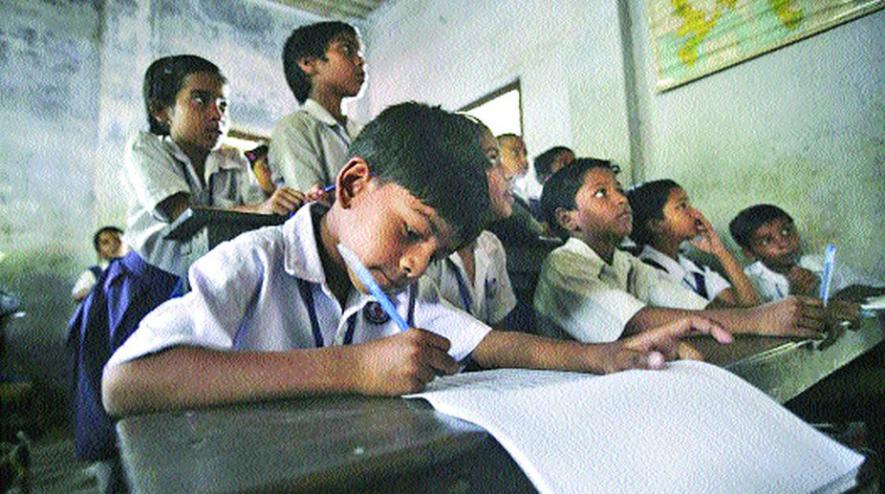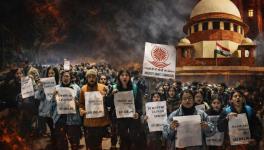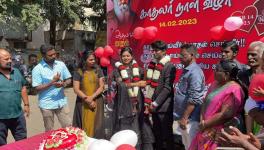With its Strident NEP Opposition, Stalin's DMK Asserts Dravidian Credentials

Image Courtesy: The Statesman
The year 1953 is remembered for several political events which altered the course of Tamil Nadu politics. At the newly formed Dravida Munnetra Kazhagam's (DMK) Trichy district conference in April 1953, C. Annadurai declared a symbolic agitation against ‘northern bania exploitation’ of the Tamil people. The demand was for Dalmiapuram – named after Ramkrishna Dalmia, a cement tycoon from the north who had set up a cement plant in the town – to be changed to its original name of Kallakudi.This agitation would become the first front of the DMK’s three front agitation. MGR’s formal association with the DMK also began in 1953 when he joined the party. That year Periyar went on an idol breaking spree to drive home his point that there was nothing special in the clay idols or no sanctity to them.
Kula Kalvi Thittam
But what rocked and roiled the state of Tamil Nadu in the summer of 1953, more than any of these events, including Periyar’s destruction of idols, was the Modified Scheme of Elementary Education introduced by the Madras Presidency’s Congress government led by Rajaji (C. Rajagopalachari). At the time, only half of school-going age children were enrolled and 60% of them were likely to drop out before five years were up. To fix this problem, the Rajaji government’s new education policy halved the school day for children aged between six and eleven. The scheme proposed the introduction of two shifts or sessions in elementary schools. The first session would have regular teaching and in the second session students would be sent home to learn about their parents' occupation. Schools could thus double their intake by having classes in the morning and afternoon. But by making students learn their family occupation in the two hours saved, Rajaji had stirred up a hornet’s nest. The policy came into effect on June 18, 1953. Before its implementation, Rajaji had not even consulted his own cabinet or members of the legislative assembly. In his defence, he said: “Did Shankara or Ramanuja announce their philosophy after consulting others?’
But Rajaji was no Shankara or Ramanuja and he realised it very soon. Rajmohan Gandhi, Rajaji’s biographer and grandson, wrote in his book 'Rajaji: A Life', "the (scheme’s) seeming validation of the caste system killed it in its infancy and ended Rajaji’s chief ministerial career".
According to Rajaji’s scheme, most non-Brahmin students would learn low-wage skills like farming, barbering, laundering and shoemaking for half-a-day while most Brahmin students would spend the time on “white collar skills'' leading to higher paying jobs which had already been dominated by Brahmins for years. Opponents of the scheme denounced it for as a reconstruction of the Hindu caste system (as most occupations were caste based) aimed at fortification of the Varnashrama.
The Dravidar Kazhagam led by Periyar and the then newly-formed DMK vehemently opposed the policy, calling it "Kula Kalvi Thittam" (caste based policy). Realising the potential for the new educational scheme’s political mobilisation, the fledgling DMK made opposing it the third of its fronts in the Three Front Agitation. The protests that swept the state forced Rajaji to step down. His successor, Kamaraj, lost no time in withdrawing the controversial scheme. Not only did these events significantly alter the course of Tamil Nadu politics, but also had a lasting impact on the state’s education policy. Successive governments in Tamil Nadu have since then religiously followed the principle of ‘universal education’ or ‘education for all’. The results showed on the ground; by the early 1950s Tamil Nadu became the first state to start a primary school every three kms and a high school every five kms. Realising the importance of primary education, Kamaraj as the CM opened over 12,000 schools across the state, most of them in rural areas. Efforts were also made to open a school in every village that had a population in excess of 300 people. Kamaraj’s contributions towards strengthening the public education system earned him the moniker of 'Kalavi Vallal' (benevolent educator). Building on this work, during the chief ministership of Muthuvel Karunanidhi, the government of Tamil Nadu set itself an ambitious target of opening an elementary School for every km, an upper primary school for every three kms, a high school for every five kms and a higher secondary school for every seven kms.
Given this historical background, the vocal, sustained and fiercely vehement opposition of the DMK to the New Education Policy ever since its draft released in 2019, has been barely a matter of surprise to close watchers and chroniclers of the Dravidian movement. Barely a few weeks after coming to power, two prominent members of the Stalin cabinet minced no words in criticising the NEP. The Higher Education Minister, K. Ponmudy, made it clear that under no circumstances would the government allow the NEP to be implemented to protect rights of the state. Ponmudy’s colleague and Minister for School Education Anbil Mahesh Poyyamozhi went a step further, calling the NEP Kula Kalvi Thittam, thus likening the NEP to Rajaji’s Modified Scheme of Elementary Education.
While the recent statements by newly sworn-in ministers of the Stalin government and the decision to boycott the meeting chaired by the Union Education Minister Ramesh Pokhriyal have hogged headlines, the DMK’s strident opposition to the NEP is nothing new. In the run-up to the 2021 assembly polls, the DMK had left no stone unturned in its efforts to make the NEP a major poll issue. As early as July 2019, the DMK had appointed a committee of academics, senior leaders, parliamentarians, and former ministers to review the Draft National Education Policy (DNEP). The report of the committee was submitted by a delegation of DMK MPs to the HRD Minister Ramesh Pokhriyal along with a letter urging the Centre to withdraw the NEP.
While submitting the report and the letter, the DMK had issued a statement explaining why the party had decided to oppose and reject the NEP. “It talks about Hindi and Sanskrit imposition. It will hinder educational development. It aims to transfer the educational powers of the State government to the Centre. It is against the educational rights of children and rural people of India. It [ NEP] is against the Constitution, federalism and social justice. Instead of talking about national and people’s development, it places more thrust on caste-based education (Kula Kalvi Thittam).”
DMK’s Opposition Not Just About Tamil-Hindi Binary
It is pertinent to revisit the statement to dispel the highly-flawed notion that the DMK’s opposition to the NEP is mostly (or worse) entirely about the three-language formula being used to impose Hindu and Sanskrit through the backdoor. This commonly-held misconception has been exacerbated by the national media’s north-splaining of the situation coupled with its lazy, ignorant and irresponsible reporting of reducing the DMK and Tamil Nadu’s opposition to the NEP to a ‘Tamil v/s Hindi/Sanskrit’ binary.
Aiming at the creation of a highly centralised school education system, the NEP is dead against the idea of what it calls ‘numerous small schools’. As stated earlier, since the chief ministership of Kamaraj in the 1950s, successive TN governments have followed the principle of ‘Education for all', thereby opening schools, colleges and educational institutions in remote towns and villages, both big and small, to make education truly universal. If the state today is one of the finest examples of a robust public education system in the country, the credit goes largely to the state’s commitment to making education accessible to every single student, even those residing in remote, rural areas. The NEP says it wants to end ‘fragmentation of higher education by transforming higher education institutions into large multidisciplinary universities with 3,000 or more students’. The opponents of the NEP in Tamil Nadu fear that by proposing to end ‘fragmentation of higher education’ the policy will force the state to abandon its tried and tested formula.
The NEP’s proposal to conduct census-based school examinations in grades 3, 5 and 8 by a centralised agency called the National Assessment Centre has met with fierce opposition in Tamil Nadu. The argument is that conducting exams in the third, fifth and eight standard will act as a filter and work against students hailing from oppressed communities or a rural background. Those in favour of the NEP counter this argument by claiming that students who fail to pass these assessment exams will not be detained. But this argument does not consider the possibility of assessment exams instilling a fear of failure in the minds of students (and their parents, guardians) who fail to clear the assessment exam, thus, pushing them away from the main curriculum and towards vocational education at a very young age.
For instance, going by the provisions of the NEP, which focuses on ‘local factors’ for vocational education, if assessment exams are conducted at the school level, say, in a government school in a village, there is strong possibility of students being divided in two batches – those who managed to meet the assessment standards and those who failed to clear the exams. In such a system, if vocational education is made available at an early age, students belonging to the second category may opt for vocational education and ending up working in farms or pursuing other such jobs such as working at the local manufacturing firm.
On similar lines, the NEP also proposes setting up a National Testing Agency (NTA) for conducting centralised entrance exams for undergraduate and graduate admissions. This effectively means doing away with multiple entrance exams and tests for admissions to different institutes of higher education. This is being viewed by a large section of Tamil academia and the DMK as another ploy to discriminate against students from socially disadvantaged and exploited groups. Furthermore, a highly centralised system of admissions as proposed by the NEP will fail to ensure better quality or bring equality into higher education.
In the bitterly contested world of Tamil politics, it is almost unimaginable and impossible to see the two Dravidian parties – the DMK and AIADMK – agreeing on an issue. With the NEP, the Centre has managed to do just that. In the run-up to the assembly elections, both the DMK and AIADMK had hit out strongly against the three-language formula proposed by the NEP, alleging that such a move was nothing but a desperate attempt to use the backdoor to facilitate imposition of Hindi and Sanskrit. It did not help that the NEP mentions offering a prominent place to Sanskrit in school and higher education claiming that ‘as a modern classical language, Sanskrit possesses more literary value that Greek and Latin combined’. Worse, the NEP maintains radio silence about the place of Tamil (or other Indian languages), in education.
The allocation of the powers of the Union and the state governments have been mentioned in the seventh schedule of the Constitution. Education was a state subject in the Constitution till 1976. During the Emergency the 42nd amendment to the Constitution saw it being moved to the Concurrent list. A greater stake in power sharing and autonomy for the states has been a defining trait of DMK’s politics since Annadurai's time. It is therefore not surprising to see the party demanding that education be moved from the Concurrent List to the State List. The DMK had mentioned the same in its 2021 election manifesto. The NEP has revived the longstanding demand of shifting education back to the State List. It is worth noting that DMK and other Dravidian scholars and activists have been batting for the inclusion of education in the State List even before the NEP was introduced. It is being argued that the NEP will further deprive the states of their rights and powers on education. The example of the state’s Anna University is being cited to drive home this argument. Anna University was established by the state government, which also bore the infrastructure costs and provided for salaries of the staff. Going by the provisions of the NEP, the state government will have no say in the functioning of the university, even in the appointment of the Vice-Chancellor!
An ambitious target set by the NEP is achieving a Gross Enrollment Ratio (GER) of 50% in higher education by 2035. In other words, the aim is to ensure that 50% of the population in the age group of 17-24 years will be enrolled and studying in institutes of higher education by 2035. But Tamil Nadu had already achieved about 49.2% GER in higher education in 2018. Put simply, the southern state is miles ahead of the rest in the country. The state’s game changing mid-day meal scheme has helped it achieve almost 100% enrollment in schools. When it comes to higher education, the state has the highest number of engineering colleges in the country and an impressive 31 govt-aided or funded medical colleges with 2,800 seats, the second-most in the country. In terms of quality of higher education too, Tamil Nadu is a clear frontrunner. According to the NIRF 2020 rankings, the state has the highest number of institutions in the Top 100 in the country.
Going by these statistics, it becomes amply clear that instead of dictating terms to the Government of Tamil Nadu (or forcing it to abandon its time tested education policy for the NEP), the Union Government will be better off learning from the 'Tamil Nadu model'.
The first lesson will be to understand and acknowledge the fact that an overarching, highly centralised, micro-managed education policy with scant regard for the spirit of federalism has absolutely no space in a diverse, multicultural and multi-linguistic nation like India.
The author is a freelancer based in Bombay and an alumnus of Mumbai’s St. Xavier’s College. His interests vary from politics, psephology, and journalism to regional Indian cinema. He tweets @Omkarismunlimit
Get the latest reports & analysis with people's perspective on Protests, movements & deep analytical videos, discussions of the current affairs in your Telegram app. Subscribe to NewsClick's Telegram channel & get Real-Time updates on stories, as they get published on our website.
























